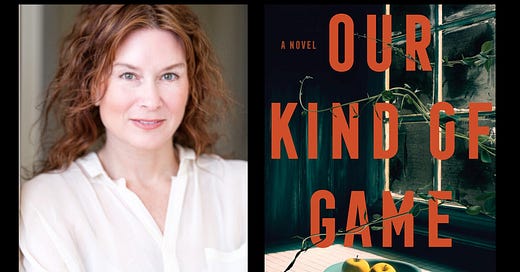Johanna Copeland Talks Twisty Thrillers, Social Tensions, and Watching Leopards (and a Giveaway!)
with Greg Wands
Johanna Copeland is a native Oregonian and former corporate attorney. Her writing has been featured in various publications, including the Washington Post, Stonecoast Review, Literary Mama, and xoJane. She currently lives in McLean, Virginia, and visits her college-age children as often as they will allow. She has one child still at home who likes frequent walks, chasing balls, and sleeping on the couch while Johanna writes.
Our Kind of Game is available now. Keep reading for a chance to win a signed copy!
Johanna, much like the character Stella from your debut novel, Our Kind of Game, you worked as an attorney before embarking upon your current career. Could you tell us a bit about the journey from the legal world to becoming a published author?
This might sound weird, but working as a corporate lawyer was fundamental to my writing process. I worked in project and asset finance, which was document heavy, meaning each deal had many, many legal documents and each document interacted with the others in multiple, complex ways. The process of learning to track concepts across documents and make them all work together was like my own personal MFA. To be clear, I did not go straight from law to dashing off a novel that was instantly picked up by a big five publisher. Instead, it was a ten-year marathon where I wrote seven novels (at least three of which were terrible), acquired a new understanding of heartbreak through three unsuccessful submissions, and learned to celebrate the smallest of milestones, like getting a piece published in xoJane for $25.
From the very first line of the book, your writing is visceral and granular and beautifully observed. How did you develop and refine your prose style?
That’s high praise! Now I’m now a little embarrassed to admit the extent my ADHD plays in developing my prose. In revisions, the moment I’m bored or look away from the page, I assume others will too. The words have to hold my attention first. My other revision trick is to read everything out loud (mumbling to myself like a crazy person). If I pause or stumble, it tells me the sentence doesn’t work yet. This leads to lots of pretty sentences that then get cut by the ADHD boredom meter. If someone was in search of an efficient writing process, I would advise them to run as fast as possible away from mine!
A prominent theme you explore in Our Kind of Game is violence against women. You use overt examples, but also examine the ways in which misogynistic terror can be insidiously subtle and baked into the fabric of our culture. What drew you to the subject?
True story: a neighbor came to my house late one summer evening when everyone was out and asked me for help. She was badly bruised and, at first, she told me she fell. Then later, she told me the truth about her husband and the things he’d done to her. A few weeks after that I discovered a cabal of neighborhood dads were gossiping about her. Their consensus was that her claims of abuse were suspect due to her history of alcohol abuse. The rage that gossip mill conclusion unleashed in me was a little frightening, but it led me to spend an entire summer thinking about the connection between subtle misogyny and domestic violence. It’s a thread woven through every woman’s life that I wanted to depict, but I wasn’t sure how to do it without sounding preachy. By the end of the summer, I’d come up with the idea of a twisty thriller where the villain isn’t one person, but misogyny itself and the havoc it wreaks on both male and female lives.
Much of the tension in the story is derived from studies in contrast—the public-facing self vs. the interior life, the perks and pitfalls of privilege, the ways in which presumed power structures can be upended. Were these ideas you initially set out to tackle, or did they develop as you worked?
It wasn’t intentional, but I’ve always been fascinated by those contrasts. Even when I don’t set out to talk about them, they pop up in my work. For me, public facing self vs. interior life, privilege and power structures are all intimately intertwined. Comprehension of the tension inherent in those structures is essentially our modern day key to survival and well being. I grew up on a farm with a large herd of cattle and my mother used to say, “every herd achieves its own pecking order, and I’m not just talking about the cows.” I spent a lot of time thinking about that, then observing the way humans use masks, privilege, and power structures to stake their position in whatever herd they’ve chosen. In my writing, I love both depicting that process and giving the reader a glimpse behind the masks we all wear.
I found the character of Sharon to be mesmerizing. On the face of it, she could be considered morally gray, but you render her with such humanity and compassion that the reader becomes incredibly invested in her outcome. How were you able to so deftly thread that needle?
I thought about Sharon a lot because I knew readers could easily turn against her. In order to prevent that, I framed her actions in terms of survival and her close relationship to her daughters. At one point, Paula compares her mother to a lion and points out that a lion cub isn’t afraid of its mother. Later in the book, Julie admires her mother’s talents and questions what she could have become if she had lived in a world that didn’t require her to focus so relentlessly on survival. Later, when Sharon takes her crimes beyond what’s necessary for her own survival, I had Paula compare Sharon to a sponge that soaks up toxins in the ocean. The trick was to keep reminding the reader of Sharon’s deep love for her daughters and juxtapose that against the way the societal cards are stacked against single mothers of minimal education and low socioeconomic status. Because Sharon refuses to back down, despite everything she has to overcome, we root for her even though, technically, we shouldn’t.
We’re all about the thrills here at Thriller Thursday. What has thrilled you lately?
I just returned from South Africa where I spent an hour one evening watching a young female leopard stalking her prey. There was a moment, somewhere in the middle of that hour, where she rolled on her back and sort of batted at the air. Mask off, for a moment she was just a harmless kitten, but then the impala moved and her deathray focus switched back on. That glimpse into a leopard’s interior world was absolutely thrilling!!
What are you currently reading?
I don’t like to ever risk being without a book so I’m always reading multiple books at the same time. My car/waiting room book is currently Get the Picture by Bianca Bosker. My summer sitting outside book is Chlorine by Jade Song, and on my nightstand is Nightwatching by Tracy Sierra. That last placement is not ideal because Nightwatching is giving me Nightmares! If you haven’t read it yet, you should! It’s so good!
Question for our readers. Answer in the comments for a chance to win a signed copy of Our Kind of Game!
Johanna’s question: What unlikeable character has provided you with the most thrills?









For me, the unlikely character who has given me the most thrills is the one that I least expected, the one who always blends in the background, who always is a caring husband/wife, a loving father /mother, who is one's closest friend. Such character always gives me goosebumps!
The first unlikeable character I ever encountered that made a lasting impression on me was Tom Ripley in "The Talented Mr. Ripley" by Patricia Highsmith. He is a shapeshifter, adapting himself easily to any situation and drawing people into his con. Ripley is charming yet absolutely merciless, insidious and unpredictable and that makes the character compelling. The thrill is smoldering danger unchecked.